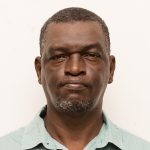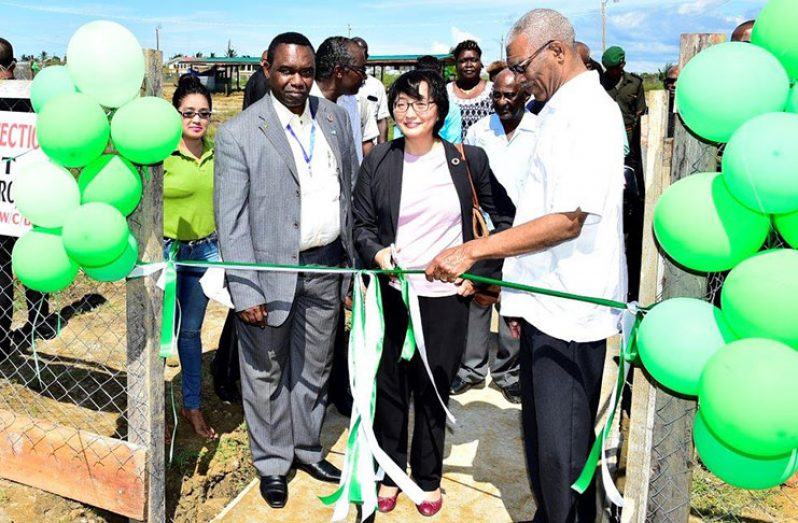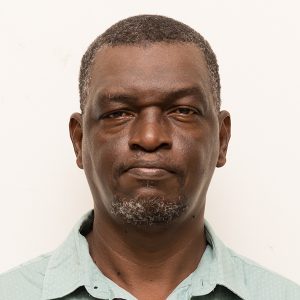— says president at agri project launch in Region Five
Story and photo by Clifford Stanley
PRESIDENT David Granger said food production is central to the ‘greening’ of Guyana and is a major part of his vision for sustainable development and for advancing the good life for all
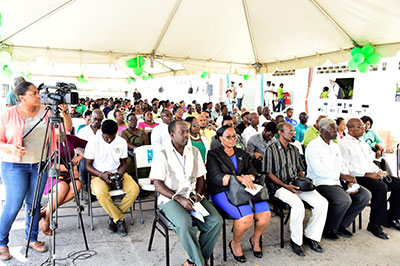
Guyanese.
He made the statement while delivering an address to persons present at the opening of the Self-Sufficient Agricultural Economic Services Project at the Hugo Chavez centre at Onverwagt, West Coast Berbice Friday afternoon.
The project is an initiative of the Ministry of Social Protection and the startup comprises three fish ponds, a number of pens for ducks, fowls and sheep and a greenhouse for production of vegetables.
The collaborators for the project included the Guyana Livestock Development Agency (GLDA), the National Agricultural Research and Extension Institute (NAREI), the Fisheries Division of the Ministry of Agriculture, the Food, Agricultural Organisation (FAO) and the St Francis Community Developers (SFCD) of Region Six (East Berbice/Corentyne).
It was disclosed that the project also benefited from contributions by members of the private sector in Region Five ( Mahaica /Berbice) and further afield.
The aim of the project is to produce food for the centre and sell the surpluses.
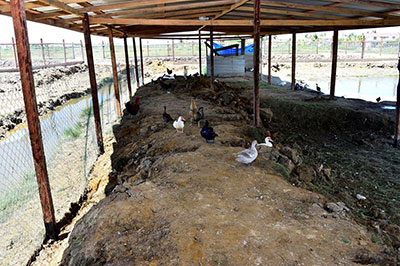
Those present at the opening yesterday included Social Protection, Minister Amna Ally, several government ministers including Minister of Indigenous People’s Affairs, Sydney Allicock; local representative of the Food and Agriculture Organisation (FAO), Reuben Robertson; United Nations (UN) Resident Coordinator, Mikiko Tanaka; Alex Foster of the (SFCD), officers and councillors of the Regional Democratic Council (RDC) of Region Five and senior agricultural officers and a large gathering of members of the public.
Manisha Wong, a semi-finalist for the Miss Guyana 2017 crown was a special invitee at the event.
It was revealed that her platform for the Miss Guyana 2017 crown would be agriculture and school feeding.
GOOD MODEL
In his remarks to the attendees, President Granger hailed the project as a good model for all agencies in Guyana to follow, contending that food production is central to the establishment of a green state.
He said food is life and no food is no life and any initiative to produce more food is laudable.
“I would like to see every house in a yard; every yard with a garden; every garden with trees. I would like us to eat what we grow. We should eat what we produce. For example, if every household in Region Five had one bread fruit tree, we could produce a million kilograms of bread fruit every year. This way we can not only feed ourselves and our children and our families but the entire Caribbean region as well.”
He said also that the project at the Hugo Chavez centre can and should be replicated countrywide
“There are some institutions in Guyana which consume enormous amounts of food. It costs $250,000 to feed one prisoner per year. When you add the prison population, when you add the number of people in hospitals, in the Security Forces, the amount of money to feed all these people adds up to billions of dollars.
“There is no reason why the Guyana Prison Service (GPS) cannot have a model farm like this. Mazaruni Prisons should be sending food to other parts of the country. I would like to encourage other Government agencies to follow this example by setting up productive enterprises to reduce the food bill and private enterprises, as well, to get more involved in food production to help Guyana to become a green state and ensure that Guyanese are well fed and protected from food insecurity.”
Other speakers at the hour-long ceremony to launch the project included Minister Ally and Robertson of the FAO.
EXPAND
Minister Ally thanked the private sector individuals and others who had contributed to the start up and said the centre intends to expand over time.
She said the Ministry will work arduously for the centre’s sustainability.
“This Ministry will never allow this to grind to a halt or die.”
In his remarks to the gathering, Robertson stressed that the FAO has supported the project because it regarded it as being at the core of the organisation’s mandate to eliminate hunger, malnutrition and poverty.
“We believe that there is absolutely, no reason why Guyana through good governance, effective public policies and smart partnerships cannot be the first country in the Caribbean to zero hunger and poverty.”
He urged the managers and workers to be accountable at all times.
“Keep proper records; follow the government procedures; this initiative is a business and we must demonstrate best practices.”
He stressed the importance of commitment by all involved and urged the technical agencies such as the NAREI and GLDA to ensure they give timely and effective advice to those involved in the day-to-day running of the project.
The Hugo Chavez Centre for Rehabilitation and Reintegration houses indigent persons who have no fixed place of abode, the less fortunate and homeless who may be in need of medical assessment and treatment and counselling and psychological assistance to enable them to become disciplined and productive members of society.



.jpg)


